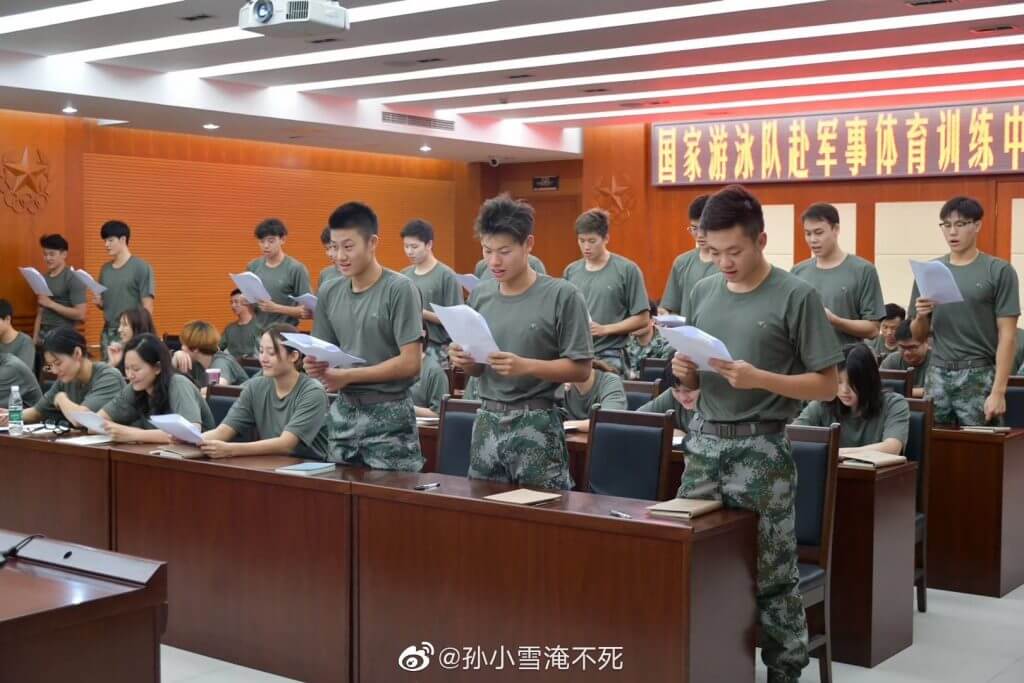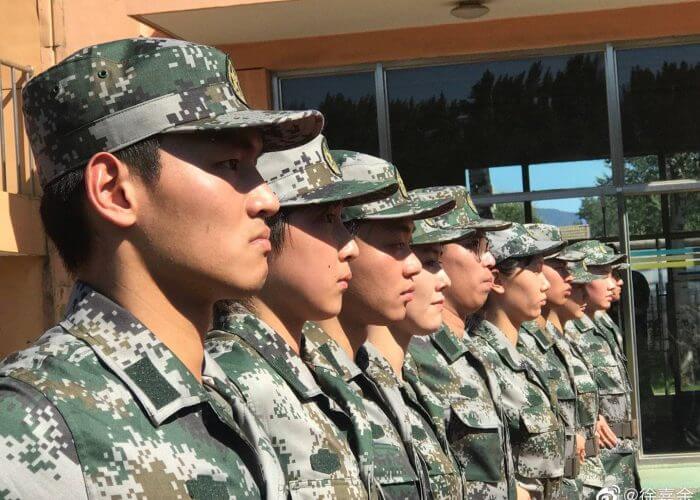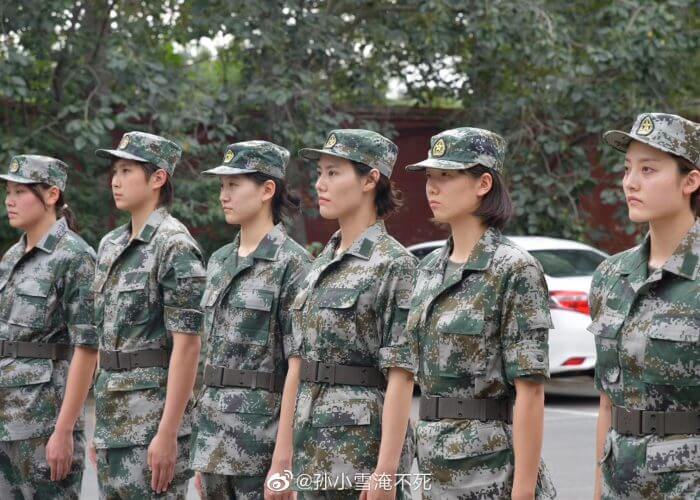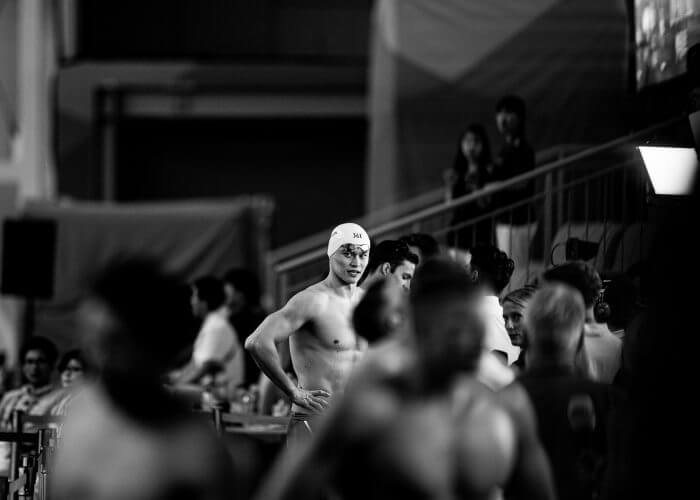China Swim Team On Its 2nd Military Exercise For ‘Love Of Party & Country’ On Way To Tokyo2020

Editorial content for the 2021 Tokyo Olympic Games coverage is sponsored by GMX7.
See full event coverage. Follow GMX7 on Instagram at @GMX7training #gmx7

China Swim Team On Its 2nd Military Exercise
China’s national swimming team has taken part in traditional military training exercises for the second time ever. On the way to the Tokyo 2020 Olympic Games, the exercise was designed to instil in the athletes “a sense of discipline … a tighter team spirit … a [greater] sense of mission” as well as “making the team members love our Chinese Communist Party and our country”.
Links between the military and athletes exist in many countries but it is rare for a nation to openly declare the link between its Olympic athletes and politics when the Olympic Charter deters such things.
China emerged from the World Championships in Gwangju with three gold atop seven medals last month. The military camp was designed, reported the Australian Telegraph today as a “punishment” for relatively “poor” results in Korea, sparking protestations from Chinese fans on social media.
Beyond posting images showing the Chinese swimmers being serious but also clearly having fun, while in military uniform, in classrooms and outdoors on drill, the Twitter account of fan club ‘Chinese Swimming News and Results’ explained:
“It’s just an ordinary military training, which happens routinely in Chinese schools and national teams. It’s also a compulsory course in every Chinese high school and University. It’s a fun process and there’s never been any abuse, and it’s definitely not a punishment.”
The five-day camp was held at the People’s Liberation Army Sports Training Centre in Beijing. Chinese swim team leader Cheng Hao noted:
“The military training this time, which is the second time in the history of Chinese National Swim Team, was to heighten the Chinese athletes’ sense of discipline, build a tighter team spirit, increase their sense of mission, making the team members love our Chinese Communist Party and our country, so the athletes will be fully prepared for the 2020 Tokyo Olympics.”

China Swim Team on military camp – Photo Courtesy: Weibo

China Swim Team on Military camp – Photo Courtesy: Weibo
Pictures posted on Weibo by the swimmers and fans show team members dressed in full military fatigues, reading papers in a classroom as well as standing to attention, some looking bored, some trying not to laugh, others trying to look tough.
Among those on camp were Ye Shiwen, alomost two Olympic cycles beyond her controversial double-gold Olympic victories on medley at London 2012, two-time men’s backstroke world champion Xu Jiayu and Fu Yuanhui, the Olympic 100m backstroke bronze medallist who became a global internet sensation at Rio 2016 after she spoke to the media about how menstruation cycles affect athletic performance.
Sun Yang Busy On Other Matters
The notable absentee from the military camp was Sun Yang, the freestyler who tested positive for a banned substance in 2014 and is currently awaiting a date for a hearing at the Court of Arbitration for Sport. In March, the World Anti-Doping Agency contested a FINA Doping Panel decision to let the swimmer off with a series of severe rebukes but no penalty after an acrimonious visit by out-of-competition testers last September.

Sun Yang – Photo Courtesy: Becca Wyant
The September 4-5 visit to Sun’s home ended at 3.15am after four hours of argument and with no urine sample being provided and a vial of blood being smashed with a hammer by a security guard acting on behalf of Sun’s manager and mother. The swimmer shone his smartphone torch on the scene outside the control room, according to witnesses to the FINA Doping Panel hearing.
On Sun’s absence form the military camp with his teammates, Cheng noted:
“He consumed a lot of his energy and is physically and mentally tired. He needs to time to recuperate.”
That did not stop 28-year-old Sun, who was seven when he joined a swim program, taking to social media in China this week to pronounce his innocence.
A tentative date of late September was replaced with a date in late October. While no date has yet actually been confirmed, the CAS announced this month that the hearing would be the first to be held in public, at the request of the parties to the case, since the Michelle Smith De Bruin case in 1998.
In his social-media statement, Sun declares: “Luckily, the surveillance camera has recorded everything, which helps me defend myself in the face of groundless accusation. The testers are all my compatriots, there was no misunderstanding during the communication. Everything is as clear as the sun at noon.”
The presence of surveillance cameras in an anti-doping control room will raise eyebrows in the world swimming community. Cameras are not only unusual in such circumstances but would be open to legal challenge under European law and the laws of countries beyond that, if only on privacy grounds unless express permission had been given by all parties present.
Those and many other issues are expected to be put to the test at the CAS in Lausanne in October or as soon after that as all parties have their legal arguments in place.
Meanwhile, Chinese media are reporting that the Doping Control Assistant – the man present for no other reason or task other than confirm that Sun’s urine sample was indeed provided by Sun, says he wants nothing to do with the case, having done a favour for a former classmate by agreeing to carry out the task he was asked to perform. He is reported to have said that he was asked to be the DCO and instructed in what he needed to do the day before the testing evening.
The FINA Doping Panel Report states that Sun objected to the DCO taking “fan” photos of him before the entourage entered what was proposed and accepted as the doping control room (in a local community club facility in the complex where Sun lives). Sun also objected to the DCO’s ID card as proof of identification and claimed the man needed specific accreditation from the IDTM testing agency.
The FINA Doping Panel disagreed with some of Sun’s assertions on that while the DCA, the main Doping Control Officer (DCO), begged to differ with that account when she gave evidence to the FINA Doping Panel hearing, which includes the following assessment:
“The Athlete was not satisfied with the DCA’s identification card. The Athlete complained that this was not proper authorization for a DCA. The DCO explained repeatedly to the Athlete that she had appointed the DCA and that she had trained the DCA to perform the specific tasks that he was responsible for during this testing mission (to merely witness the passing and collection of urine). The DCO told the Athlete that the DCA had signed an IDTM document called a Statement of Confidentiality (SoC) confirming his appointment, the training he had received from the DCO and agreeing to standard confidentiality provisions. The BCA had signed a similar IDTM SoC. However, the SoC documents were considered internal IDTM documents and the DCO did not have them with her. Both of the signed SoC were filed with the Doping Panel.”
In is conclusion and caution to Sun, the Panel of three lawyers sends this rebuke to the swimmer and his entourage on the DCA and DCO and identification:
“The Athlete’s entourage continually asserted that the IDTM DCA should have presented to the Athlete DCO accreditation and related authorizations. This is absolutely not required – despite testimony that in China it is standard for all individuals who attend at a sample collection session to be trained as DCOs. In the ISTI, and for all tests performed by other Sample Collection Authorities while in China, it is perfectly proper for DCAs or Chaperones to perform their limited roles and tasks with no DCO accreditation. This so-called “higher standard” claimed by the Athlete’s witnesses is not required in the ISTI, and is absolutely not a justification to refuse to accept the credentials of an otherwise properly authorized DCA, who is not a DCO.”
Earlier, the FINA DP Report states:
“The Athlete did not accept that the DCA was properly authorized by IDTM and insisted that the DCA leave the doping control station. Much discussion ensued. The Athlete took pictures of the DCA’s identification card and sent the pictures to unknown persons. The Athlete’s mother threatened the DCO, claiming that she had police contacts and could determine if the DCA was, in fact, properly authorized to test her son. In the result, at the Athlete’s insistence, the DCA was excluded from the doping control station.”
Sun stated on social media that he objected to the identification of all three agents, the DCA, the DCO and the nurse pressent to collect blood (the BCA, blood collection agent) but the FINA Doping Panel report suggests otherwise, stating:
“The DCO finished notifying the Athlete using a paperless system. The blood samples were successfully collected by the BCA. The process was completed by about 11:35 p.m. The Athlete took no issue, at the time, with the BCA’s authorization from IDTM or her qualifications to draw his blood. The BCA placed the Athlete’s collected blood samples in secure containers inside the cool box and this was placed on a table in the doping control station.”
There is no suggestion in the FINA Doping Panel report that Sun at any time objected to the DCO. Beyond that, The FINA Doping Panel made clear its serious concerns about Sun’s conduct when it noted the following in its conclusions before deciding to let the swimmer off without penalty:
A Caution to the Athlete:
“Although not required to decide the case, the Doping Panel feels compelled to point out its very significant concerns regarding the conduct of the Athlete and his entourage. Avoiding an anti-doping rule violation in this matter should not be equated with the Doping Panel condoning such a strategy in future situations. While ultimately successful, it was a close-run thing.
“The Athlete’s success ultimately hinged on the Doping Panel’s interpretation of what “official documentation” was required to be provided by the Sample Collection Authority. The Athlete’s entire athletic career hung in the balance – on what amounted to, essentially, a gamble that the Athlete’s assessment of the complex situation would prevail. That strikes the Doping Panel as foolish in the extreme.
“As many CAS awards have stated, it is far more prudent to comply with the directions of a DCO and provide a sample in every case, even if provided “under protest.” Subsequently, all manner of complaints and comments can be filed, rather than risk any chance of an asserted violation when an aspect of the doping control process becomes a concern. Staking an entire athletic career on being correct when the issue is complex and contentious is a huge and foolish gamble.
“In fact, the Doping Panel rejected many of the Athlete’s contentions and positions as being unfounded and invalid. The Athlete and his entourage were not correct regarding many aspects of the sample collection session. That should be a sobering lesson to the Athlete. The following are but examples;
- Signing the Declaration prepared by Dr. Ba was not evidence that the sample collection personnel agreed with its substantive contents. In contrast, it was a form of Report that any athlete may submit at the conclusion of a sample collection session (see ISTI Article 7.4.4). DCOs are instructed to sign any and all such athlete provided comments. Others may sign as a witness. ISTI Article 7.4.6 references the need to have the DCO sign the documentation to confirm that the comments provided by an athlete (or Dr. Ba) reflect the athlete’s concerns – not to confirm that the DCO is in agreement with them.
- The time of the testing mission (commencing at about 11 p.m.) was perfectly appropriate. That it continued so long into the night was unfortunate, but no ground to fault the conduct of IDTM or FINA. This was at the very end of the “60-minute” time period specifically identified by the Athlete when he would be available to be tested. Indeed, the Athlete narrowly avoided a potential Missed Test allegation as he arrived just as the 60-minute time period was ending.
- The Athlete’s entourage continually asserted that the IDTM DCA should have presented to the Athlete DCO accreditation and related authorizations. This is absolutely not required – despite testimony that in China it is standard for all individuals who attend at a sample collection session to be trained as DCOs. In the ISTI, and for all tests performed by other Sample Collection Authorities while in China, it is perfectly proper for DCAs or Chaperones to perform their limited roles and tasks with no DCO accreditation. This so-called “higher standard” claimed by the Athlete’s witnesses is not required in the ISTI, and is absolutely not a justification to refuse to accept the credentials of an otherwise properly authorized DCA, who is not a DCO.
- The events in 2017 involving the Athlete and the DCO (when she was in training to be a certified ITDM Doping Control Officer) did not give rise to a conflict of interest so as to disqualify the DCO from acting in her role at the sample collection session on September 4, 2018. Complaints were made and comments were written at the conclusion of the session in 2017, but in no way did that disqualify the DCO from continuing to test the Athlete, now or into the future. Likewise, the Athlete’s testing history and the latest negative test result were not relevant to the issues before this Doping Panel.




